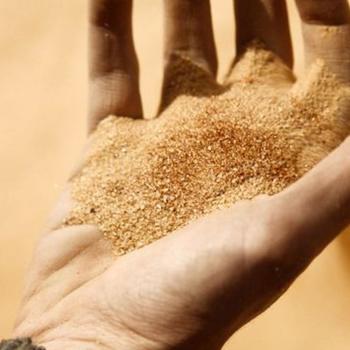The sacrifice of Abraham was complete in his willingness to go forth with the commandment of God without hesitation; the sacrifice of Ismail was complete in his complete trust in his father and utter submission to the will of God, without question or reluctance. What greater trial or sacrifice can be comprehended by us as humans than the sacrifice of one's own child? Surely, there can be no greater sacrifice. As the verses above state, because Abraham and Ismail were prepared to readily comply with the commandment of God, their story of sacrifice would be commemorated for ages to come, not only in religious text and through prophetic stories passed on from generation to generation, but in the annual pilgrimage that every Muslim should make at least once in his or her life.
The would-be sacrifice is memorialized and observed in the ritual sacrifice of animals during the hajj pilgrimage, since Abraham then sacrificed a ram instead of his son. This ritual sacrifice is also for those who are not on the pilgrimage, through the celebration of the holiday of Eid ul-Adha, or the Feast of the Sacrifice. It is recommended to slaughter an animal and share its meat with family, friends, and those in need.
However, the entire journey of Abraham, from his trek through the barren desert, to the story of Hajar and Ismail and the well of Zamzam, his erection of the structure of the Holy Ka'bah and the story of sacrifice have become immortalized in the experience of the pilgrim's journey during hajj. This journey of the pilgrim, even today, is the journey of an individual recreating this sacrifice, travelling physically and spiritually from his earthly home to his point of spiritual original — returning to the House of God. The pilgrim abandons his base desires, his worldly attachments, his personal relationships in search of spiritual cleansing and fulfillment. Hajj, like each pillar of Islam, calls on the worshipper to sacrifice some earthly, materialistic attachment to bring him closer to God.
The spiritual recharging, the physical struggle, the recreation of rituals, the overcrowding, heat and lack of control in the process, is uncomfortable and trying, and it may lead one to the very brink of disaster, but one finds solace in remembering the sacrifices of Abraham, Hajar, and Ismail, remembering that they, too, walked the same paths and that their only comfort was their trust in their Lord.
Hajj may be seen as the culmination of the five pillars of Islam. It allows you the opportunity to truly enact the first pillar, bearing witness that there is no God but God and that Muhammad is his messenger, as God brings you home to his House, the Ka'bah, to testify this fact. In remembering the story of Abraham who proclaimed this message of monotheism even as a youth, the pilgrim finds peace. And like the second pillar of Islam, prayer, or salah, the pilgrim must take time out of his life to perform the physical act. Like the third pillar, fasting, or sawm, the pilgrim must suppress his physical appetites to elevate his soul. And like the fourth pillar, almsgiving, or zakat, we must set aside a portion of our wealth to make this life-changing journey.
As we are removed from our comfort zone during this pilgrimage and are placed in situations that try our bodies, minds, and hearts, we are constantly reminded that sacrifice is an essential part of strengthening our faith. Though Abraham was prepared to make the sacrifice he was commanded to of his own volition, oftentimes we are forced into situations that require sacrifice and must react accordingly. The true test of faith lies not necessarily in what is being sacrificed, but our response to it. We may confront difficulty in our relationships, loss of loved ones, health or wealth, or trials in other circumstances of our lives. Although we may not act with the strength and obedience of Abraham or Ismail, their examples give life to the true concept of selfless, unadulterated sacrifice in the life of a believer.




